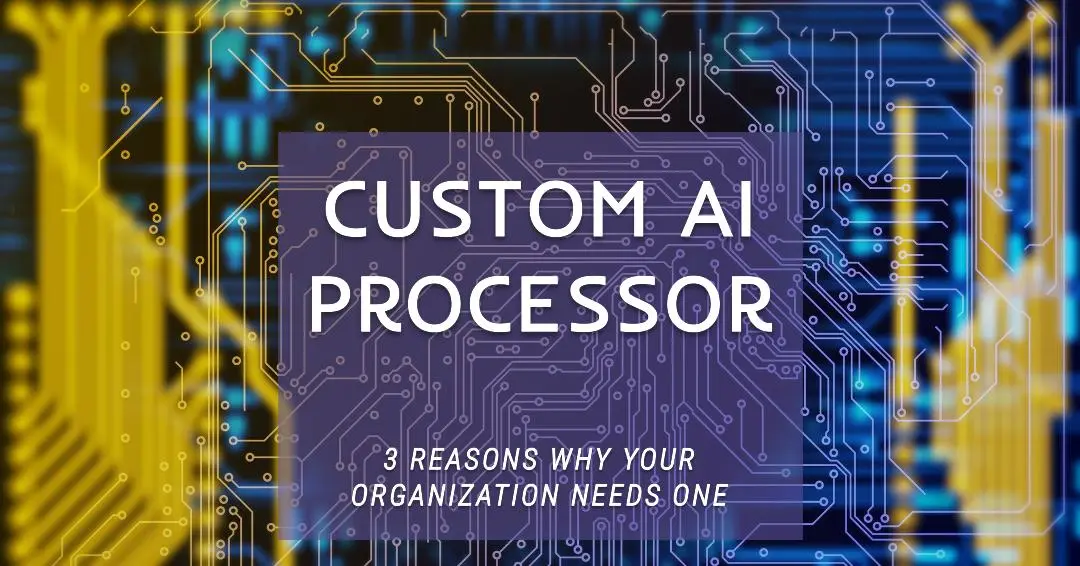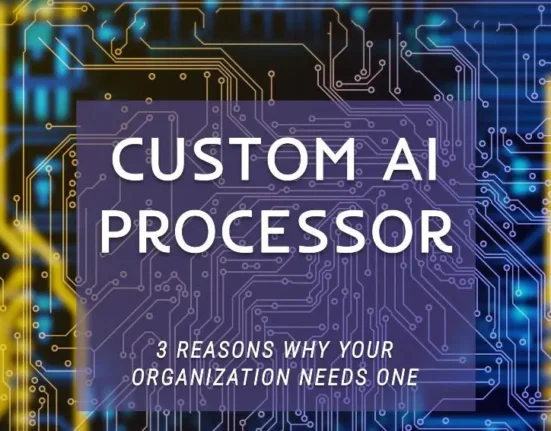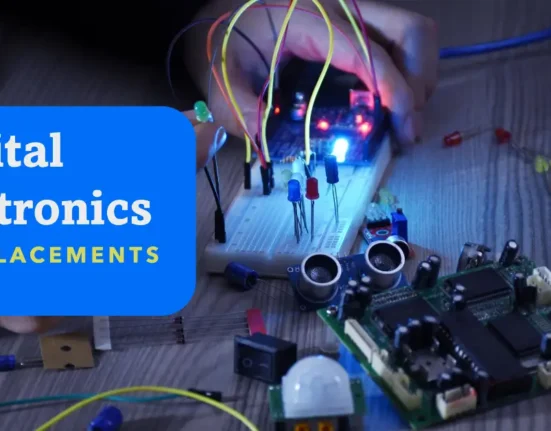Our world has rapidly changed since the advent of AI. From facial recognition on smartphones to self-driving cars, we have plenty of examples where AI is playing a key role. However traditional central processing units (CPUs) designed for general-purpose computing struggle to keep pace with the demands of complex AI tasks. This is where custom AI processors come in, offering a leap forward in processing power and efficiency specifically tailored for AI applications.
As Gary Kasparov, chess grandmaster, aptly said, “The future of artificial intelligence is not in replicating human intelligence, but in surpassing it.” Custom AI processors are a key component in achieving this goal.
Table of Contents
ToggleWhat is a Custom AI Processor?
Unlike a CPU that can do various computing tasks, a custom AI processor is built for only one special task: Accelerating AI workloads. The custom AI processor achieves this by mimicking the structure and function of artificial neural networks (ANNs).
You can imagine ANNs as learning machines inspired by how our human brain works. ANNs are built like interconnected nodes of tiny processing units that process information. By feeding them massive amounts of data, they learn to identify patterns and make predictions. It’s like showing a baby a bunch of cats until it can tell the difference between a cat and a dog on its own.
Custom AI processors are designed on this interconnected architecture. This interconnected building style allows them to handle the massive parallel processing required for AI algorithms. For industry readers, it’s important to note that there are different types of custom AI processors, such as graphics processing units (GPUs) and tensor processing units (TPUs), each with its own strengths for specific applications. To learn more about each of them you can visit the article “Types of Custom AI processor”.
Today various companies are using Custom AI processors, from Meta to Apple every company has developed their own custom AI processors.
Companies making Custom AI processors.
The companies using custom AI processors include Nvidia, Intel, Alphabet (Google’s parent company), Apple, IBM, Qualcomm, Amazon, and Microsoft. These companies have developed specialized AI chips tailored for various applications, such as training large language models, accelerating generative AI, and enhancing performance in data centres.
Here is the complete table of various companies who have made their custom ai processor , with their custom AI processors names and their usecases.
| Company | AI Chip | Use Cases |
|---|---|---|
| Nvidia | Grace Hopper | Accelerated AI tasks, high-performance computing |
| Intel | Xeon Processors | AI applications requiring improved memory capacity and bandwidth |
| Alphabet (Google) | Cloud TPU v5e | Large language models, generative AI, faster data processing |
| Apple | Neural Engine | Enhancing AI performance in devices like MacBooks (M1, M2 chips) |
| IBM | Telum AI chip | Specialized AI tasks, high efficiency and performance |
| Qualcomm | Cloud AI 100 chip | Cloud-based AI applications, outperforming competitors in specific tasks |
| Amazon | Inferentia & Trainium | Generative AI models, alternative to Nvidia GPUs for specific needs |
| Microsoft | Maia 100 AI chip & Cobalt CPU | Competing with Nvidia and Intel in AI and general computing tasks |
3 Reasons Why Your Organization Needs a Custom AI Processor
Here are three compelling reasons why your organization might consider incorporating custom AI processors:
1: Enhanced Performance and Efficiency
Custom AI processors are designed from the ground up for AI tasks. This translates to significantly faster processing speeds compared to CPUs. Imagine the difference between analysing a single image on your phone and processing thousands of images in real-time for facial recognition. Some studies have shown that custom AI processors can achieve performance gains of up to 100x compared to CPUs for specific AI workloads.
Furthermore, custom AI processors are built for efficiency. They can handle complex AI computations with lower power consumption compared to CPUs. This translates to cost savings on energy bills and reduces the environmental impact of your AI operations.
2: Scalability and Flexibility
Unlike CPUs, custom AI processors can be tailored to specific AI applications. This allows for customization to optimize performance for your unique needs. Additionally, the inherent parallelism of custom AI processors allows for easy scaling as your AI models grow more complex and require processing larger datasets.
This scalability is crucial for various industries. In healthcare, for example, custom AI processors can analyze vast amounts of medical data to personalize treatment plans or accelerate drug discovery. Similarly, in the development of autonomous vehicles, custom AI processors are essential for handling the real-time sensory data required for safe navigation.
3: Cost-Effectiveness in the Long Run
While the upfront cost of custom AI processors might be higher than traditional CPUs, the long-term benefits outweigh the initial investment. The increased performance and efficiency lead to significant cost savings. Reduced power consumption translates to lower energy bills, and faster processing times lead to quicker time-to-market for AI products, generating revenue sooner.
For organizations that don’t require dedicated custom AI processors, cloud-based access to these powerful chips is becoming increasingly available. This pay-as-you-go model allows even smaller companies to leverage the benefits of custom AI processing without a substantial upfront investment.
Considerations When Choosing a Custom AI Processor
Selecting the right custom AI processor requires careful consideration. Here are some key factors to keep in mind:
- Specific AI application requirements: Different AI tasks have varying processing needs. Choose a processor optimized for your specific application (e.g., image recognition, natural language processing).
- Power consumption limitations: Consider your power constraints. Some custom AI processors offer higher performance but consume more power.
- Budget constraints: Custom AI processors can range in cost. Evaluate your budget and choose the option that offers the best value for your needs.
Industry reports and manufacturer websites provide valuable resources for researching available custom AI processors and their specifications.
Conclusion
The future of AI is bright, and custom AI processors are the engines driving its advancement. These specialized chips offer unparalleled performance, scalability, and cost-effectiveness for various AI applications. As AI continues to revolutionize industries, custom AI processors will be at the forefront, enabling groundbreaking innovations and shaping a smarter tomorrow.





